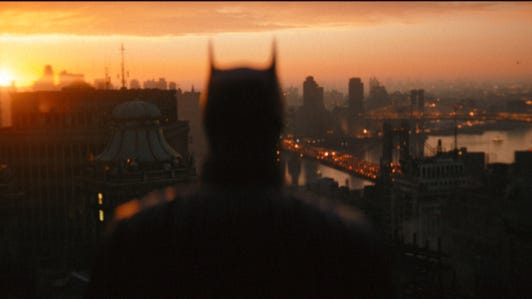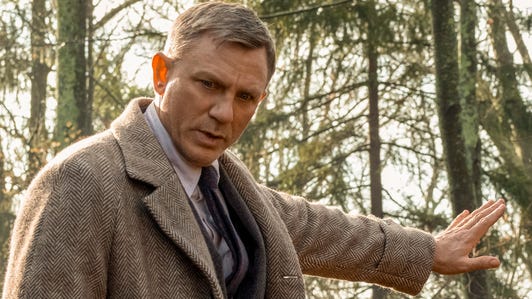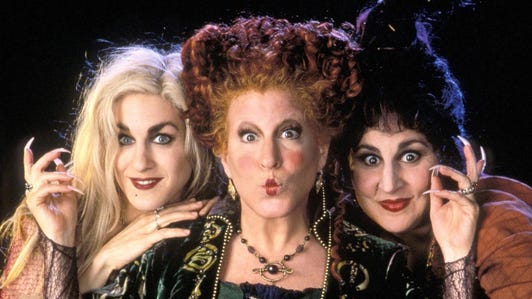
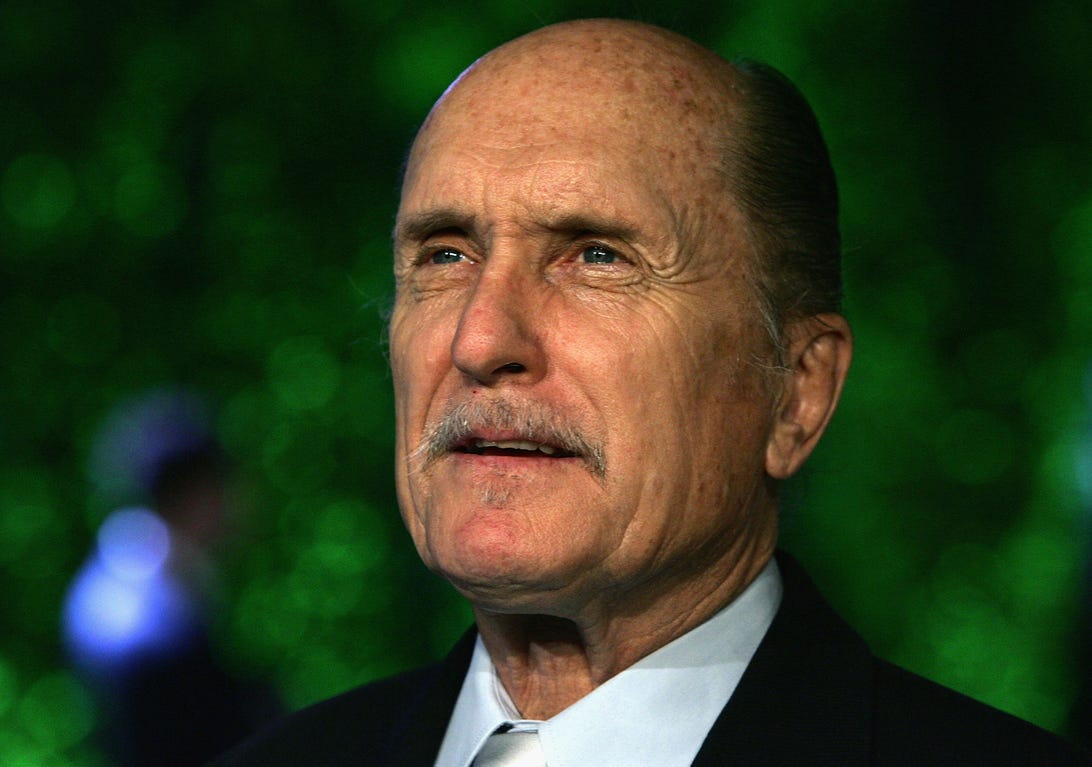
Robert Duvall, pictured here in 2005, has commanded the screen in a career spanning seven decades.
Frazer Harrison/Getty ImagesIt's an offer you can't refuse. And yet, when I was offered 15 minutes talking to legendary actor Robert Duvall about his part in cinematic milestone The Godfather, I didn't want to do it. What can you ask about the iconic 1972 movie that hasn't been asked a million times before? And can you even scratch the surface in such a short time with an Oscar-winning actor whose career has spanned 70 years?
Robert Duvall was born in California in 1931, and has appeared in theater, TV and movies since the 1950s. He was in The Twilight Zone and The Outer Limits and Bullitt. He shot it out with John Wayne (in True Grit) and Clint Eastwood (in Joe Kidd), beginning a long association with the Western genre. Playing coldly violent soldiers, vindictive executives or gruff but avuncular mentors, Duvall specialized in bringing a simmering authority to any part. He won the Academy Award for Best Actor in 1983's Tender Mercies, but many of his most unforgettable performances have been supporting roles, from The Conversation, Apocalypse Now, M*A*S*H and Network, to Colors, Days of Thunder, Falling Down and Widows. The 91-year-old will soon be seen in Netflix's basketball drama Hustle with Adam Sandler, streaming in June.
And of course, Duvall joined Marlon Brando, James Caan, Robert De Niro and Al Pacino in The Godfather (1972) and The Godfather Part II (1974), both directed by Francis Ford Coppola. Today, Duvall is doing publicity for a 50th anniversary restoration and rerelease of The Godfather films, available now in 4K UHD and digital format. He greets me enthusiastically over Zoom -- hearing I'm in the UK, he extols Tyson Fury as maybe the greatest heavyweight in history -- and laughs as he remembers talking about the Godfather on the 25th anniversary of its release. Some of his recollections are indeed a little well worn, like when he recalls how it would take Marlon Brando a few seconds to get James Caan's jokes. The actor admits he hasn't seen the films lately, but sometimes, like so many of us, he's stumbled across them on TV. "Sometimes I'll come across Godfather II a quarter of the way through, and I say, let me watch a little bit. And then I watch the whole thing all the way through. It's so intoxicating."
Duvall notes that Coppola achieved this masterful filmmaking despite pressure from the suits at movie studio Paramount, who didn't want to cast Brando or Pacino. "Coppola had to work under duress," Duvall notes. "I admired him and gained a lot of respect for him because he feared at any moment he might be fired by the studio. But he kept going to make it his vision."

Robert Duvall lurks in the shadows as Tom Hagen, behind the Godfather himself: Marlon Brando as Don Vito Corleone.
Paramount Studios courtesy of Getty ImagesDuvall worked with Coppola several times, enjoying the freedom he was given. "Coppola wasn't one of these directors -- I've worked with a lot of 'em -- who say, Do this, Do that," Duvall explains. "He wanted to see what you bring, to interpret what he's written down. I call that from ink to behavior: You take what's written, but you got to put it somehow into organized behavior."
For example, Duvall cites how he transformed the character of a cartoonish military officer in Apocalypse Now's script by drawing on his own military experience in the US Army, and on his father, who'd been a rear admiral in the US Navy. The result is the chillingly gung ho Lt. Col. Bill Kilgore, played by Duvall as brimming with specific quirks as he delivers the famous "smell of napalm in the morning" speech.
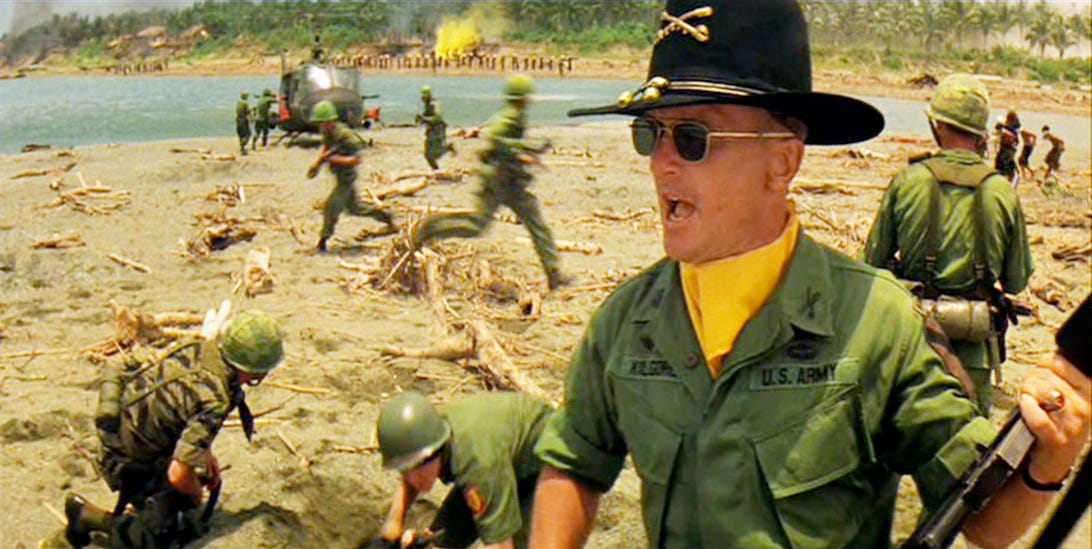
"Smells like... victory!"
Getty ImagesDuvall describes Coppola as one of the three biggest influences on his career. So, does he regret choosing not to appear in Coppola's belated and divisive 1990 sequel, The Godfather Part III? "No," Duvall says, with no hesitation. "Not at all."
In the first two Godfather films, Duvall played Tom Hagen, adopted son and considered consigliere to the Corleone family. Even at the time he felt they were onto something. "I knew it about a third of the way through Godfather I," he says, "that we were really into something extremely special. I had a feeling it was gonna be an important film. I've only felt that twice."
And the other important story? The epic and acclaimed 1989 television miniseries Lonesome Dove, also starring Tommy Lee Jones, Danny Glover, Diane Lane and Anjelica Huston. Adapted from the novel by Larry McMurtry, it was a smash hit in the days when movie stars rarely crossed over into TV, and breathed new life into the moribund Western genre. "I went into the dressing room of Lonesome Dove," Duvall remembers, "and I said, Boys, we're making the Godfather of westerns!"
For some of The Godfather's cast -- notably Pacino and De Niro -- their careers were immediately transformed. But it took a little longer for Duvall, who'd in fact been one of the more established members of the cast before the film was made. "I had things I'd done before that," he says, "Some of it started right then for some of the other guys in Godfather I or II, but it would be 10 years later to start things that meant a lot to me. I've been going over some of my things I've done since then, and lately I've been watching some of them I haven't seen in years and years."

Robert Duvall scooped up the best actor Oscar at the 56th Annual Academy Awards in 1984, for his role in Tender Mercies, written by Horton Foote.
Bob Riha, Jr./Getty ImagesWith so much attention paid to The Godfather over the decades, I ask if this time spent watching his old films has turned up any he'd forgotten, or if he'd seen any in a new light. "Convicts, by Horton Foote," he replies straight away. "Very interesting film." The 1991 latter-day Western was written by Pulitzer- and Oscar-winning Texas playwright and screenwriter Foote, who Duvall credits as another huge influence on his life. Co-starring James Earl Jones and Lukas Haas, Convicts sees Duvall play an increasingly infirm former Confederate soldier struggling to run a plantation in 1902. Like many Westerns, it's a film about aging, about facing the end at the end of an era.
"I played a very rural guy, so far from somebody like Tom Hagen, like maybe one of my uncles in Virginia here," Duvall chuckles. "You always draw from people, you draw from life, and they know you're observing them and even sometimes you let them know you are observing them. You're always out looking, looking, looking for something to propel you into something you can use... from ink to behavior."

Tom Hagen makes an offer in Francis Ford Coppola's The Godfather: Part II.
Getty ImagesDuvall has been talking to me from his home in Virginia. "My wife is from Argentina, and she said for her, Virginia is the last station before heaven." I want to talk more about this lovely but portentous statement, and I ask why Duvall has been revisiting his past films. Does he feel he's facing the end? Inevitably, I run out of time before I can ask.
Instead, for my final hurried question, I return to The Godfather -- specifically, the trilogy's piercing opening line. Does Robert Duvall, like the undertaker in the first film's opening scene, believe in America?
"Oh, absolutely," he says, once again with no hesitation. "I always said the United States of America is like a big giant athlete with a lot of potential. Made mistakes, but a lot of talent."
"It's a crazy world now," he adds. "Nuts." Sadly, before I can ask him to elaborate, I really am out of time. But there's always time to watch The Godfather films again, not to mention any of the other classics from Duvall's long career.









 Add Category
Add Category